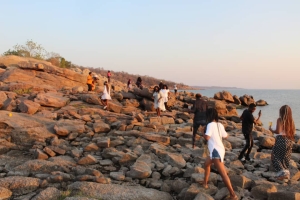Zambia is a land of beauty adorned with vast woodlands rich with majestic baobab trees. As far as the eye can see, wild, undulating landscapes adorned by rivers finish in glorious falls. From its landscape to its 70 ethnic groups that have staved off war for decades, Zambia sets the perfect stage for the conversation on the beauty encapsulated within diversity and the possibilities that intersectionality can unlock. In the same spirit of upholding diversity and increasing inclusion in the area of Sexual and Reproductive Health and Rights (SRHR), Akina Mama wa Afrika (AMwA), under the Make Way programme, held a training on Intersectional SRHR Advocacy. The training from the 8th to 12th August 2022 took place on the shores of the beautiful Lake Kariba in Siavonga, Zambia. Make Way consortium partners, collaborating partners, and youth panel members who advocate for various SRHR issues like maternal health, adolescent health, access to safe abortion, LGBTQI+ health, and HIV/AIDS attended the training. With the goal that the diverse participants will develop and implement innovative practices for intersectional SRHR advocacy in Zambia, the training faculty evoked bold convictions in their minds to challenge systems of oppression like patriarchy, capitalism, colonialism, homophobia, and racism to usher in gender justice.

Despite Zambia having ratified several global and regional treaties related to human rights and SRHR, a brief look at the statistics on the acceptance and realization of SRHR in the country shows that there is still work to do. More so with the high maternal mortality rates linked to unsafe abortions, high teenage pregnancies, sexual and physical violence, and a high prevalence of HIV/AIDs. The continuous invisibilization of sexual minorities and diversified youth coupled with unprogressive socio-cultural and religious norms and oppressive policies and laws has stunted progress towards desirable SRHR outcomes.
The one-week training provided space to address these social issues with modules on feminist theory, intersectionality, legal status and policy frameworks around SRHR on the regional and national level, and Feminist Advocacy. Feminist advocate Dawn Cavanaugh facilitated modules on Feminist theory and intersectionality, providing a deep dive into feminist theory and principles intended to raise feminist consciousness and activate the participants’ minds towards a transformative analysis of systemic problems. In addition, the session brought forth a rich discussion around cultural and religious values and their compatibility with feminist values. The question in the room was, can one be a Christian, espouse traditional values, and still be a feminist?
To resolve this question, day two began with a formal debate, and the participants fired up their opinions with echoes from religious books and the constitution. The discussion offered a space to intellectually explore the core principles and values on which culture, religion, and feminism stand and juxtapose them against the current social issues. By the end of this session, the participants had a framework from which they could analyze issues like gender-based violence, and SRHR, setting the stage for the subsequent sessions.
The head of the SRHR programme at AMwA, Olabukunola Williams, facilitated a sesssion expounding on SRHR and concepts within SRHR like body autonomy, the spectrum of sexual orientation, structural issues, ideas and ideologies underpinning the challenges to universal access to SRHR. Next, Namuchana Mushabati, a feminist and lawyer, took the participants through legal and policy frameworks in SRHR in Africa, where participants were familiarized with core human rights frameworks that anchor SRHR. The session also looked at the status of SRHR with data, gaps in progress, and the lived realities of people with compounded vulnerabilities, like people living with disabilities, sexual minorities, youth, women, and girls.
The last two days of the training were spent in practical sessions building intersectional feminist advocacy plans that involved conducting a power analysis, stakeholder mapping, developing key messages, choosing advocacy tools, and measuring impact. The training ended with a certificate ceremony confirming the ability to apply intersectional feminist analysis in their advocacy.
“My key take away has been how to structure advocacy. As young feminists, it is easy to get lost in the social media arguments and forget that the people who can effect the change are sitting in parliament buildings and spaces like that.” – Mwangala Monde, a young feminist activist.
Because rest is resistance, somewhere in this intense five-day training was room for some fun and relaxation as the participants bonded over board games, a sunset cruise around Lake Kariba, and danced Kalendula into the cool Zambian night.
